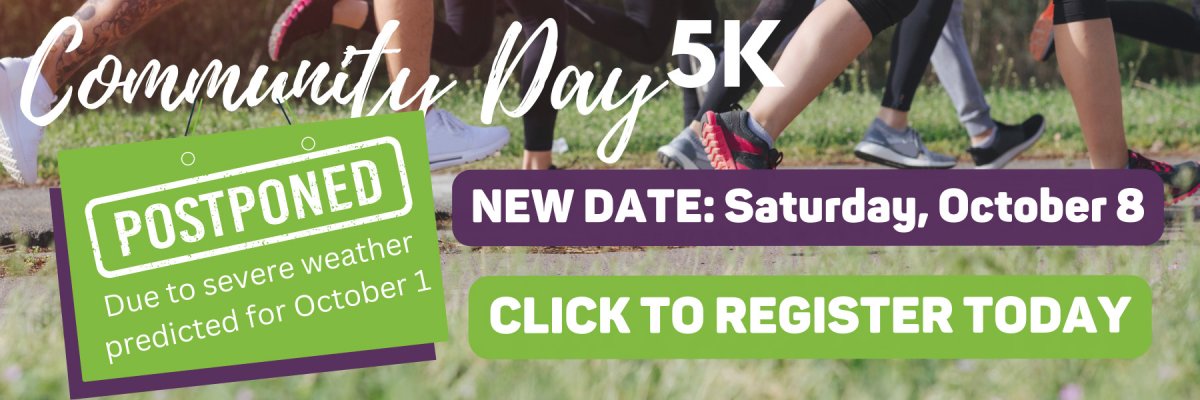Tips for the College's 5K, Good Advice

Michelle Alexander, an assistant professor in Health, Physical Education and Wellness at Virginia Peninsula, is an avid runner. She has participated in 5Ks, 8Ks and half-marathons.
Carolyn Hunter has taught health and fitness classes at the College since 2013 and is a former Christopher Newport University women's basketball coach.
The two offered advice for novices participating in the College's Community Day 5K. The event, which will take runners along the Matteson Trail off Hampton's Butler Farm Road, will benefit the College's Educational Foundation.
Alexander's main advice is simple.
"People should have fun. This day is all about community," she said.
That noted, they offer some pointers for beginners.
- Train
"If you don't think you can run, that's not true," Alexander said. "Everybody can, barring any medical issues."
There are numerous training programs available, and one she likes is "Couch to 5K," which is interval training.
"You do a series of 20-minute workouts, and you start by running one minute, and walking one minute," she said.
The goal is to run more and walk less each time so that by the day of the event, you can run for at least 20 minutes.
"Most people, if they consistently do the interval training, they'll find they can run more than that," Alexander said.
Added Hunter: "There needs to be a little bit of time spent before coming out and jumping into it. I know it's just a 5K, but you should be familiar with the distance."
Alexander said even though many training programs are about six weeks and the Community Day 5K is in less than a month, there is enough time to prepare.
Two other suggestions to assist with training are find a partner who will hold you accountable, and do some trail runs. Running on a treadmill at the gym or around a track is different from running on the Matteson Trail. If possible, at least walk the trail before event day so you know what it's like.
- Nutrition and hydration
It's important to note this starts well before race day. If it were a half-marathon, Alexander suggests adjusting your diet two or three weeks ahead of time. But with the race just a 5K (3.1 miles), that's not necessary.
"You just need to make sure that you're eating a well-balanced diet and that you're getting enough carbohydrates," she said.
Another good idea is to track what you are eating while you are training and see how your body reacts.
"What you don't want to do is eat something totally different from what you've eaten and then have some unfortunate incident," Alexander said. "The morning of, you want to have a good combination of a carbohydrate-rich breakfast along with a little bit of protein."
She suggests a pre-race meal of whole grain bread, peanut butter and a banana.
Make sure you don't eat anything that is heavy on the stomach.
"Fried foods would not be a good thing before racing," Hunter said, but you want something that provides enough energy so you don't feel hungry during the run. "But you also don't want anything too heavy that's going to upset your stomach."
Energy bars are an option, but check what is in them, some are high in added sugar. Juices are not recommended because, they too, have a lot of sugar.
Increasing your water intake in days leading up to the race is just as important. And then drink before, during and after the event.
"Take advantage of the water tables," Alexander said. "It's OK if you slow down a little bit to grab some water."
- Proper gear
This starts with a comfortable pair of running shoes, but you don't have to spend a fortune. Hunter suggests shoes with a lot of cushion, that fit well, and have laces. Sneakers you just slip on are not a good idea.
With the 5K on an October morning, it could be chilly at the start but 80 when you finish.
""Layering is good," Alexander said of how to dress. "And make sure that you're prepared for whatever elements."
Hunter recommends wearing sunscreen and a hat if it's an unusually sunny day.
- Stretching and warming up
You shouldn't be cold when you start the run. The objective isn't to warm up as the run progresses, it's to be warm when you begin. Arrive early, do stretching exercises and then either walk around or jog.
"Stretching before and after is something I tell my students all the time," Hunter said.
- Pace yourself
Alexander and Hunter said a problem they have seen all too often is newcomers don't know how to pace themselves.
"If you start out too fast, you're going to burn out," Alexander said.
The last thing you want is to tire out after the first mile. If you follow your training program, you should learn what a comfortable pace is for you.
"You have to know your own body," Alexander said. "You have to know your own physical abilities."
Paying heed to those five items should set you up for success, whether that's hitting a specific target time for the 5K or just finishing, which leads to one more piece of advice from Alexander.
"A common problem people make is that they don't set realistic goals for themselves," she said.
While she's an avid runner and is looking forward to this event, her goal isn't to set any record.
"I know I am not going to get my best 5K time because I'm at a different point in my training," she said. "I'm just going out there to have fun."
Again, that should be the goal. The worst thing is to have such a miserable experience that you'll never try it again.
"Listen to your own body. Know your limits," Alexander said. "Have what I call a reach goal: just a little bit further than you think you can do. Then just celebrate whatever you can do."
